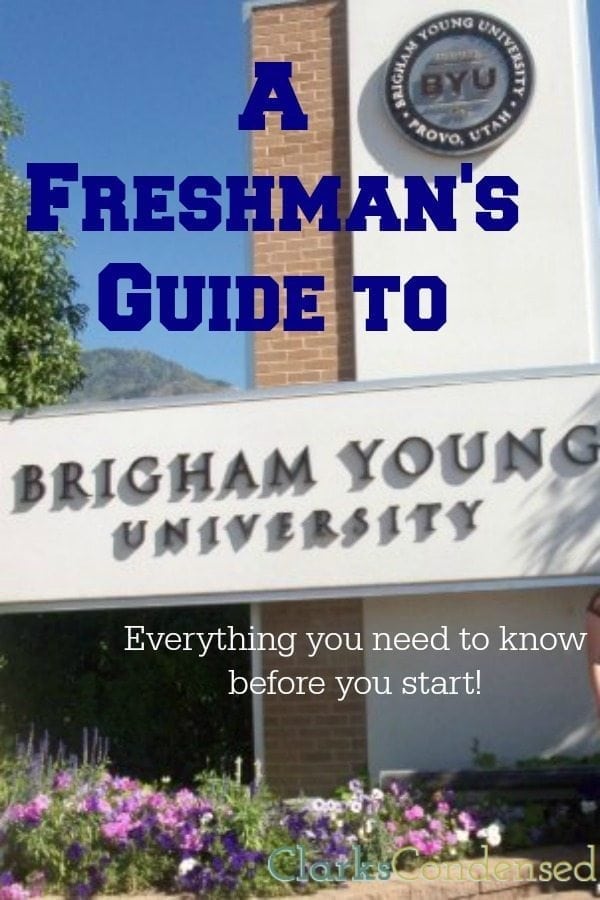BYU Classes and Jobs – A Freshman’s Guide
This post turned out to be much longer than I initially anticipated, so I split it into different sections. Here are the different sections, as well as what they cover, in case you want to skip around:
Part One: Housing and Food
Part Two: Classes and Paying for College and Jobs
Part Three: Fun and Entertainment/Freebies and Deals
Classes
Chances are, you are going to BYU to get a good education. If you are just going to have fun…well, there are cheaper ways to do that! Either way, it’s important to know how to sign up for classes, which classes to sign up for, and more!

As a freshman, you are at the bottom of the totem pole. Class registration priority is assigned according to how many credit hours you have. So, if you happen to have a million AP credits, you are in a slightly better place. However, most freshman are going to have the last pick of classes. Just accept it, and hope that you at least get some of the classes you want!
Tricks for Getting your Classes
Don’t worry, there are some ways to get the classes you want. I don’t remember a time that I didn’t end up with a class I wanted. It sometimes took a work, but it paid off in the end!
When I was at BYU, I sometimes was able to get an upperclassman to register for a class I needed, and then drop it when I was able to register. I don’t believe this is a possibility anymore, because there are wait lists available for every class. As soon as someone drops it, the next person on the wait list gets the class.
So, your best bet is to try
Finding the Best Professors
I used the website RateMyProfessors.com religiously. It never let me down – I felt like people gave honest and fair assessments of professors about 95% of the time. If there is only one or two reviews, I’d take that more with a grain of salt. However, if there are tons of reviews, you are likely to get a pretty good idea of what kind of professor you are getting.
I liked doing this because I was able to find professors who I felt worked with my learning style best. No, I didn’t just try and find the easiest professor. Quite often, I would look for a professor who people said was engaging, cared about the students, and was passionate about what they taught. That did not mean easy most of the time! However, I was happy that I looked at different professors before I signed up – it was particularly helpful with GE’s.
You should also ask around to friends and fellow students. Most everyone has the
Best Times?
Okay, with the exception of a few people, I would highly recommend avoiding early morning classes during your freshman year. I thought that I could handle an 8 0’clock class (even a 9 o’clock class.) I mean, I had graduated from early morning seminary. School started at 7:25 AM when I was in high school. I was so wrong. I wish I had never signed up for those classes, because, quite honestly…I hardly ever went. Which was a bad idea!
Now, there are always exceptions to that rule. Some people are just natural early birds, and they do their best learning in the morning. Unless you are absolutely sure this is you, I’d avoid it at least during your freshman year!
I found this easier to do the further on in my college career I got, but it’s entirely possible (and wise, if you ask me), to try and give yourself some days off from classes! I tried to have my classes on Mondays, Wednesdays, and Fridays, though sometimes I got my schedule so perfect that I only had classes Monday, Tuesday, and Wednesday. Just be smart when planning your schedule!
How many credits?
To be a full-time student, you must be taking at least 12 credits. As an overly ambitious freshman, I signed up for 18. Take it from me – unless you are a super student, this is not a good idea. My grades definitely suffered, and I often found myself trying to decide if I wanted to do something fun or study. If you saw my grades that first semester, you’ll know quite well what I usually chose.
As a freshman, at least in your first semester, I would just recommend 12-15. Why? I don’t really have some scientifically proven reason for that, but I think as you are adjusting to college life (especially the newfound independence of being able to do whatever you want), less is more. There will be plenty of time to take classes, and you don’t need to feel like you have to finish college at a record speed!
Recommended Classes
There are certain classes, or types of classes, everyone has to take. These are called your General Education courses. Some of them are interesting, others not so much. At least in my opinion. Some people will try and take these all during their first few semesters, and that works. I didn’t do this, and I’m glad. I realized early on that it was important (to me) to take a few required classes but also at least one fun enrichment course. There are SO many interesting and fun classes at BYU, and I think it’s a shame if you don’t take the time to explore them. Some of my favorite classes were the non-required ones.
I’d definitely recommend taking American Heritage your freshman year. I really did not like that class (though Forrest really enjoyed it), but it’s something that most freshman take.
During my senior year, Forrest and I both took a career exploration class. I needed an extra credit, and Forrest was nice enough to take pity on his pregnant wife and take it with me. It was honestly one of the best classes I ever took at BYU, and both Forrest and I feel like it should be a required class for freshman. Obviously, we were both almost done with our college degrees, so we weren’t about to change our majors, but it really showed us so many different options. I highly recommend taking it.
You are required to take a certain amount of religious classes at BYU. These classes were some of the most academically difficult classes I ever took, but they were also some of the most life changing. I absolutely loved any church history classes – especially the ones taught by Sister Susan Black (though I don’t believe she’s there anymore.) Definitely ask around to see what are the best religious classes and teachers – it really can make a big difference in your experience. And remember – just because you get a C in Book of Mormon, doesn’t mean you don’t have a testimony 😉
Freshman Mentoring
When I was at BYU, they had something called Freshman Academy. You lived in the same area and took the same classes, and there were a few other “perks” to it as well. I didn’t do this, and I didn’t feel like I missed out. However, I know a lot of people really did enjoy it.
From what I can tell, this no longer exists. But it has since been replaced by Freshman Mentoring. Basically, you can sign up for a “reserved” seat in a course that you can have peer mentor for, as well as be in the class with our students who have that same peer mentor. The main courses available are those that fulfill the American Heritage GE requirement and the First Year Writing GE requirement, though there are other GEs (and even some that are for specific majors.) The mentors are to help you on a more individual (or small-group basis.) It definitely seems like a neat experience!
Paying for College
One of the best things about BYU is the cost of tuition. For the quality of education you are getting, the price is unbeatable. It’s cheaper for members of the LDS church, however, tuition for non-LDS students is very reasonable as well.
Still, paying for college can still be difficult, regardless of the cost. Fortunately, there are many resources out there to help you make your way through!
Scholarships
If you can secure a scholarship to help pay for tuition and living expenses, then do it! Searching for scholarships should start before you even find out if you are accepted, as many deadlines will be early in your senior year (though some scholarships can be earned before that!) Definitely see if your high school offers any scholarships, your neighborhood, and local organizations to see if you qualify for any.
Beyond that, BYU does offer plenty of opportunities for scholarships. Many of them are based on academic merit (so, it can also be taken away if you fall below certain requirements. They also have scholarships based on need, essays, and more. Once you’ve declared a major, most departments offer scholarships you can apply for as well. BYU has a great website with all the information you could possibly need – so be sure to check it out here.
There is also website called FastWeb.com. It helps you find different scholarships you might be eligible for. I never had any luck with it, but I know others have, so definitely look into it.
Pell Grants
Pell grants are basically a sum of money from the government that can be applied toward educational expenses and you do not have to pay it back. These are based on your income, so if you are still a dependent on your parent, and they make a decent amount of money, you probably won’t qualify. However, if you aren’t a dependent (usually in the case of married students), definitely consider applying for them. Forrest and I both qualified for Pell Grants after we got married, and it really helped with the financial burden of paying for school. Pell Grants are only available for your first undergraduate degree.
Federal Loans
Federal loans are available to just about anyone, though the amount may depend on need, cost of tuition and living at your school, etc. They do accrue interest, and you have to pay them back, starting six months after you graduate from college (though if you make under a certain amount, you can defer them.) Here is a basic overview of the different federal loans available (information from Direct.Ed.Gov):
- Subsidized: for students with demonstrated financial need, as determined by federal regulations. No interest is charged while a student is in school at least half-time, during the grace period, and during deferment periods.
- Unsubsidized: not based on financial need; interest is charged during all periods, even during the time a student is in school and during grace and deferment periods.
- PLUS: unsubsidized loans for the parents of dependent students and for graduate/professional students. PLUS loans help pay for education expenses up to the cost of attendance minus all other financial assistance. Interest is charged during all periods.
- Consolidation: Eligible federal student loans can be combined into one Direct Consolidation Loan.
If you can avoid student loans, I would. While the majority of students take out some kind of loan, if you can avoid them, it’s just one less thing looming over your head after you graduate!
FAFSA
For pretty much any educational financial support, you are going to need to apply for the FAFSA. This is an in-depth form you fill out online that is prepared annually by college students (in the US) to determine if they are eligible for financial aid.) If you are wanting to get financial aid, you’ll need to fill this form out.
Jobs
I was able to get a job in December of my freshman year. For me, I needed a job so I could pay for housing and save money for tuition. I was fortunate enough to be blessed with an amazing job as a receptionist at the BYU Comprehensive Clinic. A friend from Colorado reached out to me when they were in a bind and needed someone immediately, and I happened to be that person. I worked there for a few years, and it was the best job I could have asked for during that time.
I’d say my number one tip for getting a job is connections! I’d say that’s probably good advice for getting a job anywhere, really. If you are looking for a job, mention on Facebook that you are. Once I mentioned Forrest was looking for a job, and someone reached out to me a few hours later about an opening at Helaman Hall’s front desk.
However, if you aren’t fortunate to have a good connection…there are still many great opportunities to find jobs. First off, check jobs.byu.edu. Here, you’ll find all the publicly listed jobs at BYU that are available for students. You’ll find everything from jobs in the Cougar Eat, to janitorial jobs, to jobs for engineering students. These job listings are also printed off and posted in the Wilkinson Center (both by the BYU Bookstore, as well as in the job center.) My advice? If you see something that you want, job on it ASAP. Jobs are always a hot commodity at BYU, and they don’t last long! Chances are, there will be a bunch of other students trying to get that same job, so make sure you apply with your best application as soon as possible.
Other ways you can find jobs – asking! If there’s a department or place you are interested in working, talk to a supervisor and see if they have any openings. Sometimes you’ll have some luck with this.
Click here for part three!







Again, thank you for this amazing info! Paying for school is such a burden, but your tips are fabulous! I’m definitely going to have to check out that scholarship site.
Hugs!
Sarah
https://sprinklesonmyicecream.blogspot.com/
Best of luck paying for it! Luckily BYU is much more affordable than most schools (especially for the quality of education you’ll get), but I’m so glad you found some of these tips helpful. I have a lot of posts on college in general, so hopefully you can find those!